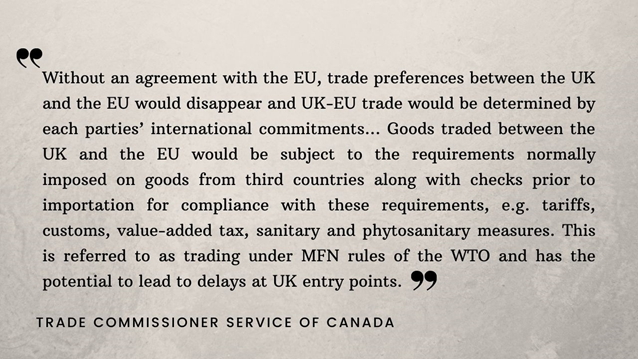Summary
- Prime Minister Justin Trudeau recently said that Canada is “ready” for a new trade deal with the UK by the end of 2020.
- While he suggested that the UK may have some capacity issues in concluding the deal, Britain has stressed that it has massive staff working on policies and expects to be done by year-end.
- Canada and UK currently trade under the existing regulations of the Comprehensive and Economic Trade Agreement, which Trudeau signed with the EU in 2016.
Canada would be ready for a post-Brexit trade agreement with the UK by the end of this year, Prime Minister Justin Trudeau said on Wednesday, November 11. But the UK government may face a ‘bandwidth’ issue in moving forward with the talks as it did not have to negotiate trade deals since it became a part of the European Union in 1973, he told media.
While Canada is looking ahead to get done with the deal before January 2021, Trudeau stressed that is ultimately up to the British government to conclude it.
Britain, on the other hand, waved off Trudeau’s claims regarding its capacity to conclude the deal and said that it has a massive staff working on trade policies currently.
Whichever may be the scene, both the countries would benefit from setting up a bilateral deal before the end of 2020.
What Happens After The Brexit Transition Period Ends?
The United Kingdom exited the EU in January 2020, but it was granted a buffer period of 11 months to hammer out new rules with trade partners during which it could continue international trade under the existing EU regulations. Trade deals with Canada continued under the Comprehensive and Economic Trade Agreement, or CETA, which Trudeau signed with the EU in 2016.
The Brexit transition period ends on December 31. If the terms of a new bilateral deal are not finalized by 1 January 2021, Canada and the UK will have to switch to the most-favored-nation (MFN) rules under the World Trade Organization terms.
As the Canadian Chamber of Commerce and Confederation of British Industry had pointed in a joint release in September 2020, the “benefits” that businesses in both the countries enjoy under the CETA would cease to exist without a trade deal.
Under the free trade accord of the CETA, which was popular with the UK, around 98 per cent of tariffs on most goods were eliminated. When it came into force a year after signing, there were plans of eliminating 99 per cent of the tariffs after seven years.
Here is what the Trade Commissioner Service of Canada says regarding the scenario after the transition period:

Which Sectors Will Be Impacted By Canada-UK Trade Deal?
Statistics regarding international trade vary frequently and is influenced by several factors. But if traditional commodities are taken in consideration, Canada’s merchandise exports to the EU, including the United Kingdom, amounted to an average of C$ 46.6 billion in 2018 and 2019 under the CETA. This was a 16.6 per cent surge from a total C$ 40 billion in the pre-CETA days in 2016, as per the Canadian government data.
Canada’s merchandise imports from the EU climbed 24.1 per cent in 2018 and 2019.
The annual average trade value in 2018 and 2019 of Canada’s merchandise exports to the UK alone was C$ 18.2 billion, a significant boost of 6.5 per cent from pre-CETA level in 2016. Canadian merchandise imports from the UK had a 2018-2019 annual average trade value of C$ 9.2 million, up 11.7 per cent pre-CETA level, as per government data.
With the COVID-19 outbreak wreaking havoc across the world, Canada recorded a substantial 10 per cent year-over-year fall in its exports to the UK in the first quarter of 2020. In March alone, when the global pandemic set in, Canadian goods exports to the United Kingdom slumped by 35 per cent YoY.
Canada’s top exports to the UK include:
- Pearls, precious/semi-precious stones, precious metals, etc.
- Mineral products, oil and distillation products
- Machinery, mechanical and electrical equipment
- Base metals and its articles of base metals
- Aircraft, vessels and other transport-related equipment
- Wood and its articles
- Chemical and similar industrial products
- Instruments and apparatus related to optical, photographic and medical use
- Vegetable products, beverages, tobacco and other food-related products
Whatever new bilateral deal comes into play between Canada and the UK post Brexit will have a potential impact on the above sectors.
According to the Trade Commissioner Service of Canada, the UK’s relations with the EU at the end of the transition period could have a potential impact on Canadian businesses. Keeping this in mind, the government body advises businesses to take “appropriate steps to mitigate risks”, especially regarding aspects such as time sensitivity, transportation, shipping across UK-EU borders, tariff or value-added taxes, etc.




